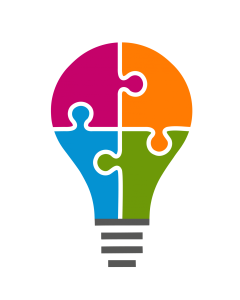17 Elaborate Activity 7
 Activity #E7: Connecting Bloom’s with Elaboration
Activity #E7: Connecting Bloom’s with Elaboration
Bloom’s triangle of knowledge relates back to elaboration. Like a kid who is curious about space and has learned all they can get their hands on to better understand it when you learn through all of these stages, you develop a deeper (elaborative) understanding of knowledge. Remember, it is all about connecting new information to additional details.
It is important though that the details relate or are important. We all have a chatty friend or relative (I’m looking at you, Mom) who, when we want to talk to them about a special event in their day, dominates the conversation with lots of irrelevant details (what they ate for breakfast, how much they cleaned their apartment that day) before getting to the good stuff. Elaboration is not just extra stuff; rather, meaningful well-connected information that directly relates to new information.
It is time to put some real elaboration work in.
- First, access course information from a current class. If you are not currently in a class, think of something you have always wanted to learn about. Consider a test you have coming up. Locate information that you need to learn for that class (if not in a class, use your imagination). You don’t have to include EVERYTHING you need to know, but you do want to think of more than one topic.
- Second, write down what you want to learn.
- Next, go back to the levels of Bloom’s. Write down what type(s) of knowledge you think it is.
- It is also a good time to think about how you will be tested (multiple choice, essay). This can determine whether the level of knowledge matches or is appropriate.
- Pick one or two concepts and provide as many relevant details as you know. You may need to rely on notes or course materials to do this.
Tips :
- Be sure you can pronounce the topic. Our brains process knowledge verbally, meaning having the correct pronunciation is key to you being able to recognize that new information later.
- Are there any images from course materials that can support the information?
- Remember, the more details you use (how something looks, smells, feels, and relates to us), the more likely you are to remember. Most likely you will not have knowledge that “smells” but if new knowledge reminds you of a smell, more power to you!
- Finally, are there any personal details that you can connect to the information? This may be something you recall about when and how you
learned the information (e.g., often teachers say to do funny things that can add to learning information). It may be something related that you saw on social media or heard in a podcast.
